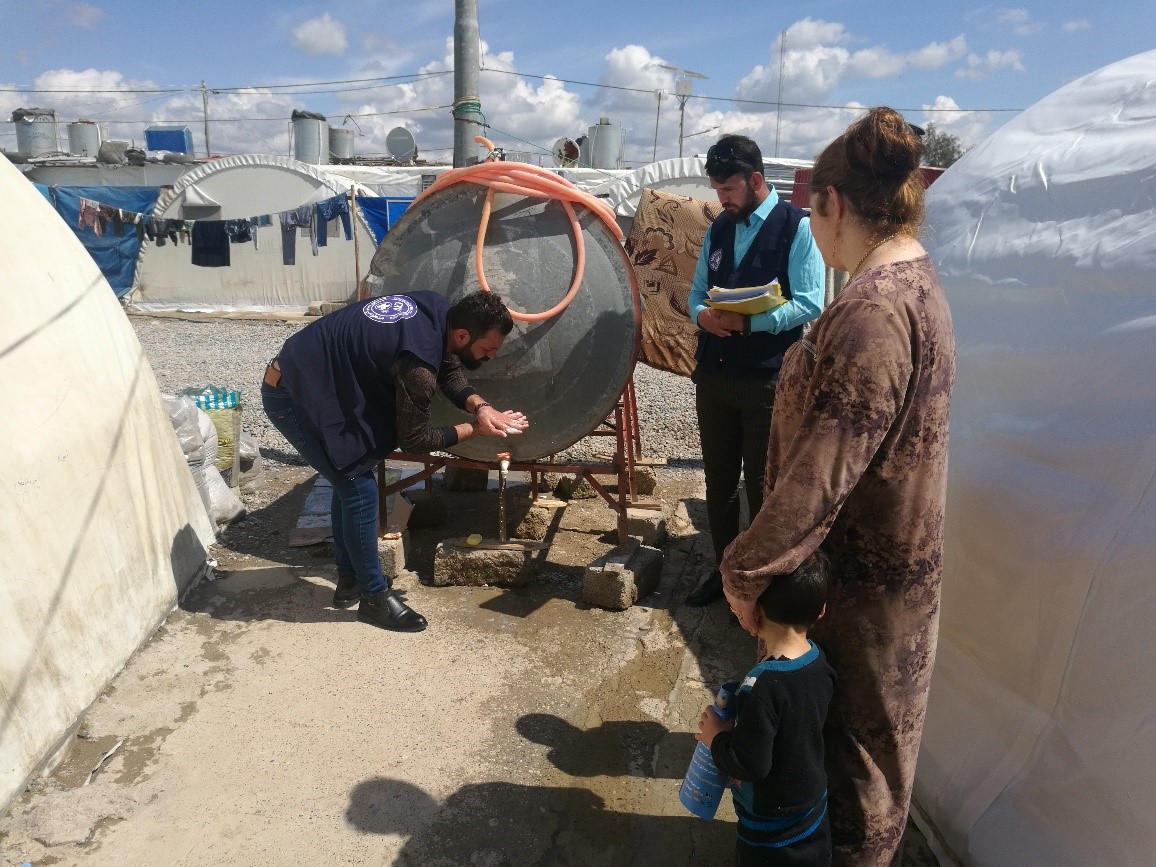Iraq is a very fragile country facing multiple political, economic, social and security challenges after the ISIS crisis. Since October 2019, the political situation has been unstable, with massive civilian protests and a gap in governance at the national level. ISIS has sleeping cells in the country, and there has been a significant increase in IS reported incidents against civilians and Iraqi security forces in April 2020.
This situation has been complicated further by the arrival of COVID-19. As of 21 April, Iraq has recorded 1,602 cases, 1,096 recovered and 83 deaths. Although the numbers are low compared to neighbouring countries like Iran and Turkey, it is assumed that cases are underreported—especially those that are mild or recovered—due to fear, lack of active surveillance, and limited testing capacity. The outbreak might also be delayed as a result of strict restrictions on movement (curfews, airport closures) and lockdown by the government.
Whilst COVID-19 does not discriminate between groups, internally displaced persons (IDPs) and refugees in camp settings are particularly vulnerable. A single case would result in an immediate emergency within the camp. Returnees continue to move back to homes that were impacted by the conflict, but many health systems are not yet rebuilt. Governorates with the highest numbers of vulnerable people include: Ninewa (331,170 IDPs and 1,785,738 Returnees), Kirkuk (99,534 IDPs and 340,942 Returnees), Dohuk (318,786 IDPs).
Furhermore, some areas have very few humanitarian actors as they were not directly affected by the ISIS conflict. Soran district in Erbil is one such place, and its proximity to Iran, high population number, low education level, and many female-led households (as many men died fighting against ISIS) raise concerns in regard to COVID-19.
What’s needed
In order to mitigate COVID-19’s impact, prevention of further spread is needed. This includes educating the community and offering basic hygiene kits for the most vulnerable populations. Unfortunately, health staff do not yet have adequate supplies of personal protection equipment (PPE) and training on infection and prevention control (IPC) is needed in all health facilities. Furthermore, restrictions on movement are affecting particular healthcare services as only immunizations and emergency treatment are being prioritised. Older people who need treatment for chronic diseases, people with disabilities, and people in need of mental health or reproductive services have limited access as a result of COVID-19.
Médecins du Monde (MdM) is responding to the outbreak through outreach activities and awareness sessions where they already operate routine health interventions. These activities started on 19 March in Chamesku IDP camp with 27 community health volunteers. The volunteers help to educate the community on good health practices and COVID-19 prevention (including social distancing, handwashing, staying at home) as well as discussing how to cope with stress. The same activities are being implemented in Kirkuk and Sinjar, and MdM is supporting the Directorate of Health (DOH) with IPC supplies and the training of staff at primary health care centre (PHCC) level. However, to do this, MdM is redirecting funds initially planned for other much-needed activities. Furthermore, the available funding is limited, meaning they can only support certain areas. To be able to extend the catchment area and reach more beneficiaries, urgent support is needed.
Still, despite the challenges, the MdM team is staying motivated and flexible. As a health NGO responding to COVID-19, they’ve been able to move inside the governorates, and good relationships with local authorities and the DoH have been instrumental to their response. For example, in Sinjar, planning and movements are discussed daily; in Kirkuk, there is close coordination as MdM is the health cluster co-lead; and in Erbil, the Minister of Health took time to discuss needs and possible support despite his busy schedule.
Within the MdM team, staff are busily organising access every day, writing reports and proposals, and translating flash updates even when this is not their usual role. Technical coordinators are in daily contact with the field teams, and trainings and instructions are being conducted online. The staff, field teams and volunteers are training in the PHCCs, doing home visits, and providing feedback through reports, supervision checklists, daily debriefs, pictures and videos. Without such a flexible team, this work would not be possible.
By Cobi Rietveld, General Coordinator of Médecins du Monde (MdM) Iraq
For many parts of the world, the battle against COVID-19 is far from over. That's why Start Network has launched Start Fund COVID-19 to anticipate and respond to virus-related humanitarian needs in low-income countries. However, of the 85 alerts received, funding is currently in place for only 14.
Key asks of donors and governments
1. Fast funding. Urgent funding is needed for the Start Fund COVID-19 pot to rapidly meet the needs of people now.
2. Funding for local actors. Urgent funding is needed for agencies and mechanism that support local actors to respond in their communities.
3. The tools to act. Exemptions for humanitarians to curfews or lockdowns,andprivileged access to protective equipment as key workers, aswell as sustained access to financial institutions and channels to swiftly transfer funds to local partners in COVID-19 affected countries.
4. Maintain wider humanitarian budgets. Existing humanitarian funding shouldnot be diverted to COVID-19 but should be provided in addition. Other humanitarian crises and natural disasters have not stopped, as we’ve seen with the devastation caused by Cyclone Harold in Vanuatu and Tonga.

